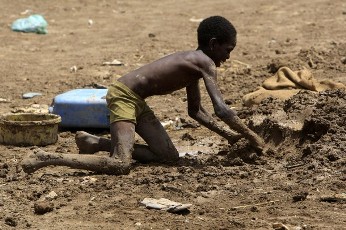Sudan to launch poverty survey in 2014
July 24, 2013, (KHARTOUM) – The Sudanese Central Bureau of Statistics (CBS) is plans distribute survey questionnaires for measuring poverty levels in the country in 2014.
 The last poverty survey which was conducted in 2009, prior to the secession of South Sudan in July 2011, revealed that 46% of the population in the north live below the poverty line including 57.6% in rural areas.
The last poverty survey which was conducted in 2009, prior to the secession of South Sudan in July 2011, revealed that 46% of the population in the north live below the poverty line including 57.6% in rural areas.
Sudan’s ministry of social welfare had previously estimated that there are 2 million poor families, including 300,000 destitute families who cannot afford to buy their daily food.
An official source at the CBS said that technical and executive committees for conducting the survey were formed and survey questionnaire was created.
The 2014 poverty survey comes amid a severe economic crisis leading economists to predict that the poverty rate would increase significantly.
Economist Hassan Sati has not ruled out that poverty rate in 2013 would exceed 95%, attributing it to agricultural deterioration, migration from rural areas to large cities and the growth of armed conflicts.
“The severe economic crisis requires the government to make some political concessions prior to reviewing its economic policies”, said Sati.
Once hoped to be the breadbasket of the Arab world, Sudan’s agricultural sector has continued to decline over the years mainly as a result of negligence, drought, mismanagement, high taxes and the overall economic climate.
The spokesperson for the opposition umbrella organization National Consensus Forces (NCF), Kamal Omer, called on the regime to step down and said that it failed to overcome the economic crisis which it had brought about, accusing government officials of stealing public money to erect high rise buildings for their families.
Economist and editor-in-chief of Elaph business weekly newspaper, Khalid Al-tigani, demanded the government “not to bury its head in the sand” and make political concessions to stop the war and spread peace adding that the government spends millions of dollars on armaments and military equipments, saying “ this money is taken from the mouths of the poor”.
He went on to say that if that money is spent on agriculture and poverty eradication, war would not break out again, adding that this will not happen under a one-party rule.
Sudan’s official news agency SUNA said that poverty line was determined at monthly income of 113.8 pound SDG in the last survey which was conducted in 2009.
Sudan’s economy was hit hard since the southern part of the country declared independence in July 2011, taking with it about 75% of the country’s oil output.
Sudan’s external debt is estimated to have grown by 27% since 2008 from $32.6 billion to $41.4 billion in 2011. The IMF forecast that the debt level will reach $43.7 billion in 2012 and $45.6 billion in 2013. The latter represents 83% of Sudan’s 2011 GDP, which was $55.1 billion.
(ST)
